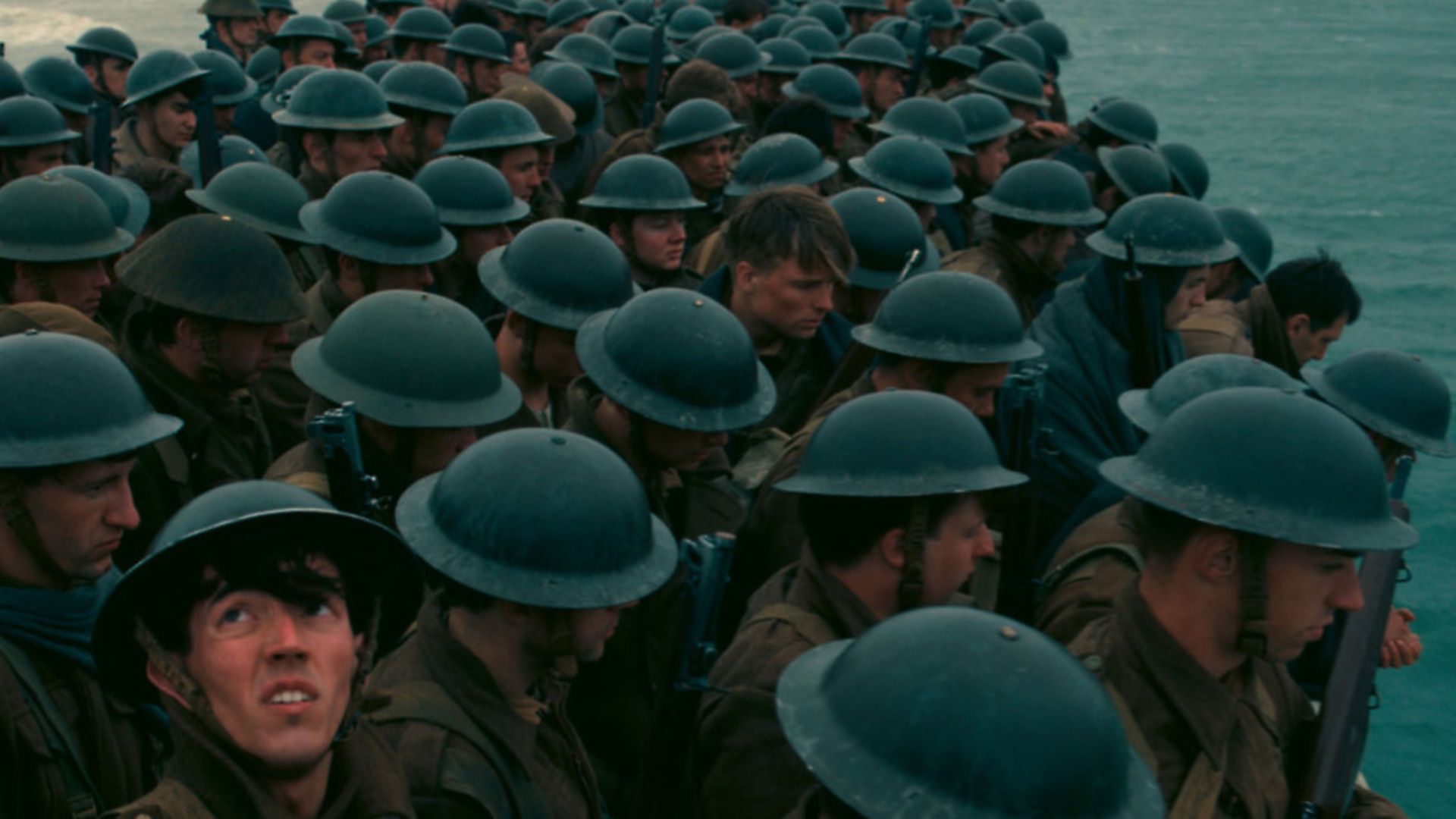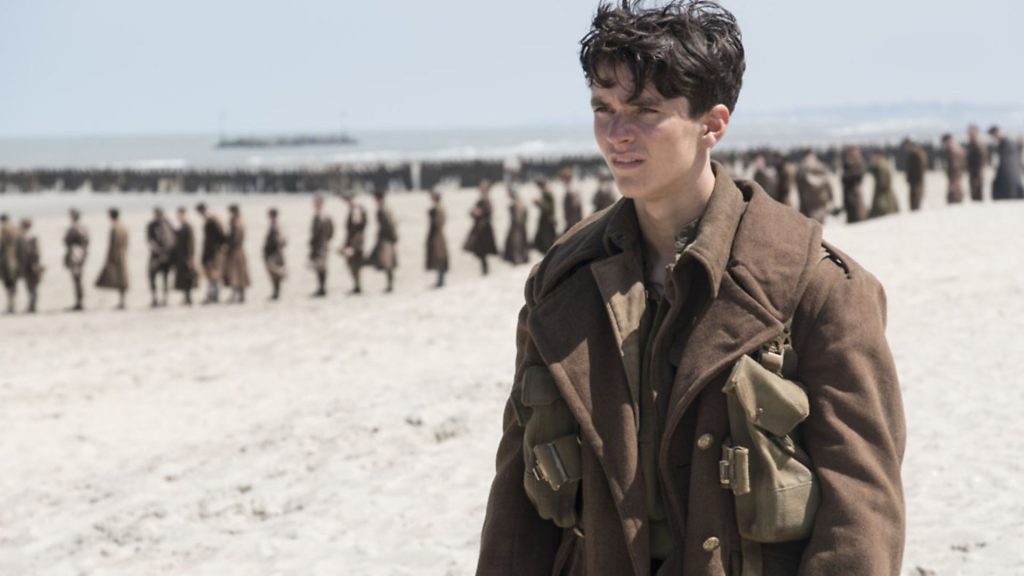
The new film Dunkirk is one of the greatest depictions of war on screen. But despite its anti-war message it also comes with some pretty heavy baggage

Shell-shocked. That’s how they describe Cillian Murphy’s shivering soldier, rescued from a sinking hull by Mark Rylance’s little boat in the middle of the madness of Dunkirk.
‘He may never be himself again,’ says Rylance of his new passenger who is soon to be joined by scores of other soldiers fished from the sea. And maybe that’s what Dunkirk, Christopher Nolan’s staggering new movie is going for – shell-shock. Audiences will emerge blinking, the sound of bombs, gunfire and panic filling their heads, augmented by Hans Zimmer’s score, which builds from taut, simmering strings to full-on siren wail. At moments, the tension and the fear are suffocating – and so immersive is the IMAX filming, that this applies to the audience as much as the characters up on screen.
Has Europe ever been the same? Certainly the war changed the map and the psyche of everyone, the repercussions and reverberations echoing still. Nolan’s film takes its place among the great depictions of war on screen – technically and emotionally, it’s a masterpiece and, for me, easily his finest movie. But what can it really mean, arriving now?
There should be no doubting Nolan’s quest for realism and accuracy, or at least the kind of accuracy only cinema is capable of when tasked with re-creating history. The film is an act of memory and compression, themes Nolan has tackled before in films such as Inception and Interstellar, but here the approach is used as a means to understanding the past and its disorder.
Yet the sight of hundreds of thousands of British leaving the shores of Europe, pulling up the gang planks and retreating home (and it being treated like a victory by most, a disaster by a few others) cannot fail to chime for these times. It would be churlish and inappropriate to equate the events of May 1940 and Dunkirk itself with Brexit, but the film was shot (at the same time of year, for more authenticity) and edited during the febrile turmoil of the 2016 referendum and its aftermath.
Nolan himself has emphasised that for him, the images of men fleeing in over-crowded boats have chilling echoes of the tragedies in the Mediterranean. ‘One of the horrible, unfortunate things with the migrant crisis in Europe is that we are dealing once more with the mechanics and physics of extraordinary numbers of people trying to leave one country on boats and get to another country,’ he has said.
‘It’s a horrible resonance but it’s very easy in our technologically advanced times to forget how much basic physics come into play. Reality is insurmountable. If you have a vast number of people in one place and they need to get somewhere else and they can’t fly and they have to get on boats – to overcrowd the boats, with that human desire for survival… it’s unthinkably horrible to see it on our front pages in this modern day and age. But it’s there.’
For the most part, however, Nolan tries to swerve politics in the film to concentrate on the pure instinct of survival. Men, young men, jump from sinking, blazing ships into the churning waters, or dive into the sand, eyes closed, praying the Luftwaffe’s bombs do not hit them. Lined up in their helmets and uniforms along the ‘mole’ (a pier-type water break) in the stricken Dunkirk harbour, they are like ‘fish in a barrel,’ as Kenneth Branagh’s Royal Naval commander realises.
The better to understand the chaos, Nolan imposes a vague structure, telling the story of the men on the mole; the sea rescue by requisitioned civilian pleasure boats sailing from our own southern ports (Ramsgate, Deal, Southend); Spitfire pilots (played by Jack Lowden and Tom Hardy) engaged in aerial dogfights that saved literally thousands.
The strands of air, land and sea are brilliantly woven together to give us some idea of the time-lines and hellish confusion. The turning of the tides was crucial, too, but it’s only recognised here when a soldier remarks that the dead bodies are now floating back to shore.
Dunkirk, make no mistake, was an early defeat for the Allied army but spun, by the collective mind and Churchillian rhetoric, into some kind of victory by the fact that so many British soldiers survived and got home when really the German army could have crushed them and changed the tide of history. ‘We shall fight them on the beaches,’ is the speech that comes directly out of its wreckage, the Battle of Britain following hard upon.
You may have heard that Harry Styles, the singer with band One Direction, makes his acting debut here among the soldiers and indeed he does, quite unobtrusively, as part of a band of brothers grappling for survival aboard various vessels, swimming through bullets, water and flaming oil to clamber onto the rescue boats. Styles’ involvement may bring a new generation of viewers to the war movie genre and their reactions will be vital.
Yet nobody could be billed as the star man in this cacophony. Although excellent, even Tom Hardy’s air ace is scarcely recognisable behind his pilot goggles and mouthpiece (Nolan really does like to mask and muffle this actor, as he did to the villain Bane in The Dark Knight Rises). Terrence Malick had a similar approach in his great anti-war piece, The Thin Red Line (1998), the big Hollywood names all fading into the background against the director’s metaphysical contemplation of the folly of war.
And we have to believe that is Nolan’s aim in Dunkirk, as if extending the horrors captured by that memorable, six-minute tracking shot from Joe Wright’s 2007 Atonement into an entire film.
This is surely intended as an anti-war movie, contrasting with the 1958 epic of the same name, directed by Leslie Norman and starring John Mills and Richard Attenborough, which is couched in the patriotic, morale-raising tenor of most British war movies of the period.
Yet I wonder if it will be universally seen that way? How will it be interpreted around Europe? This week, they had a premiere in Dunkirk, where the bulk of the film was shot, before moving the red carpet on to Paris. The French appear in Nolan’s film briefly, credited with holding the line against German advance, while a Dutch sea captain is the only representative from Belgium and the Netherlands. What will those audiences make of the sight of the British retreat from Europe, and the French soldiers being told to wait to board any ships? Even if the German enemy remain unseen and faceless, I confess to my own misgivings here.
As we enter a period of fraught politics, there seem to be more war movies than ever on our screens. This year has already brought Churchill, in which Brian Cox played the leader in the run up to the D-Day landings at Normandy, and Their Finest, a comedy about the making of a film based on the civilian boats that sailed to the rescue at Dunkirk. We had Alone in Berlin just a few weeks ago and, looking ahead, Joe Wright himself is back at it with The Darkest Hour, starring Gary Oldman as Churchill being unleashed later this year and Suite Francaise director Saul Dibb has taken on filming the classic British First World War play Journey’s End, with Sam Claflin and Paul Bettany.
I’m sure we’re meant to nod sagely that these are all anti-war pieces, but that doesn’t mean they don’t come without heavy baggage or inherent politics. They’re all told from a UK standpoint, all designed to do business in the US (they even made Alone in Berlin in English so it would travel), so stories of bravery and honour end wrapped up in the classic jingoism of the 1950s war films, re-packaging those hoary British pillars of ‘the Dunkirk spirit’ and ‘the Blitz spirit’, all of which have done so much to foster an idea of glorious isolationism and a national scepticism of Europe over the years, among football hooligans, military historians, pub bores, film producers and Brexiteers.
Even Hans Zimmer’s Dunkirk score eventually glides into a variation on Elgar to swell the pride as our boys arrive safely home to bread, jam, a cup of tea and a hero’s welcome.
Carefully, in the closing credits, Nolan dedicates the film to: ‘All those whose lives were impacted by the events at Dunkirk.’ Which means everything and nothing, as sound and fury so often do. Is the film an appeal to our general humanity? We can’t take it for granted that these days all war movies are a way of demonstrating the madness so that it should never happen again; this Dunkirk hardly appeals to a united Europe, choosing instead to flatter the British ego and its stiff sense of heroism. Indeed, the real fear you get from it is that it is all happening again. The line that really reverberated for me came from Mark Rylance, an actor who knows how to intone and make the subtext come alive.
‘Men of my age are directing this war,’ he tells the soldier he’s rescued on to his own boat, the Moonstone. ‘We can’t just send our children out to fight it.’
Dunkirk is a thundering, resounding war movie. It might leave you shell-shocked, when what you really want is just to see clearly again.
Jason Solomons is a film critic, broadcaster and author of Woody Allen: Film by Film









